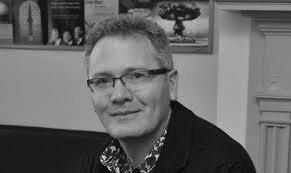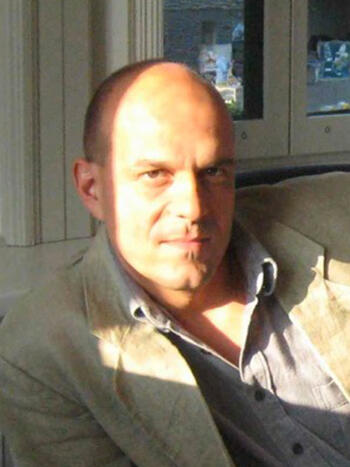The Europe Center invites you to the inaugural annual lectures in this series by Adam Tooze, Barton M. Briggs Professor of History, Yale University.
“Making Peace in Europe 1917-1919: Brest-Litovsk and Versailles”
Date: Wednesday, Apr 30, 2014
Time: 4:00 - 5:30 pm
Location: Koret Taube Room, Gunn-SIEPR
“Hegemony: Europe, America and the Problem of Financial Reconstruction, 1916-1933”
Date: Thursday, May 1, 2014
Time: 4:00 - 5:30 pm
Location: Koret Taube Room, Gunn-SIEPR
“Unsettled Lands: The Interwar Crisis of Agrarian Europe”
Date: May 2, 2014
Time: 4:00 - 5:30 pm
Location: Bechtel Conference Center
Reception: 5:30 - 6:15 pm
RSVP by Apr 23, 2014
Adam Tooze will deliver three lectures from his forthcoming book, A World Fit for Heroes. In particular, he will speak about the history of the transformation of the global power structure that followed from Imperial Germany’s decision to provoke America’s declaration of war in 1917. Tooze is the author of The Wages of Destruction: The Making and Breaking of the Nazi Economy (2006) and Statistics and the German State 1900-1945: The Making of Modern Economic Knowledge (2001), among numerous other scholarly articles on modern European history.
Open Call: The Europe Center Graduate Student Grant Competition
The Europe Center invites applications from graduate and professional students at Stanford University whose research or work focuses on Europe. Funds are available for Ph.D. candidates across a wide range of disciplines in the humanities and social sciences to prepare for dissertation research and to conduct research on approved dissertation projects. The Europe Center also supports early graduate students who wish to determine the feasibility of a dissertation topic or acquire training relevant for that topic. Additionally, funds are available for professional students whose interests focus on some aspect of European politics, economics, history, or culture; the latter may be used to support an internship or a research project. Grants range from $500 to $5000.
Applications for the 2013-2014 Spring competition are currently being accepted through April 15, 2014. For additional details about the grant program, please visit our
website.
Meet our Visiting Scholars: Andreas Kilcher
In each newsletter, The Europe Center would like to introduce you to a visiting scholar or collaborator at the Center. We welcome you to visit the Center and get to know our guests.
Andreas Kilcher, FSI-Humanities Center International Visitor 2013-2014, is professor of Literature and Cultural Studies at the Eidgenössische Technische Hochschule (ETH) Zurich. Kilcher is a prominent scholar of German-Jewish literature and culture, Kabbalah, and the European tradition of esotericism. He has written and edited a range of publications on the encounters between European and Jewish cultures from the sixteenth century through the present, with a focus on the twentieth century. His publications include Geteilte Freude: Schiller-Rezeption in der jüdischen Moderne (Munich, 2006), biographies of the writers Franz Kafka (Frankfurt, 2008) and Max Frisch (Berlin 2011) and numerous other articles. Kilcher’s current project includes collaboration with colleagues at Stanford on the divergent constructions of Jewish ethnography in German-speaking and Russian-speaking territories.
Student Scholar Profile: Christof Brandtner
The Europe Center regularly sponsors the research of undergraduate and graduate students through our research grant, internship, and scholarly exchange programs. We would like to introduce you to some of the students that we support and the projects on which they are working.
Christof Brandtner, a PhD student in the Department of Sociology at Stanford, will be visiting the Vienna University of Economics and Business to present findings from his research on city rankings. Brandter’s project explores where the criteria of systematic city comparisons come from, and how they came to supplement economic power as measures of urban performance. By investigating the types and sources of variation in the evaluation of organizations, and by mapping the ways in which urban qualities are operationalized, this research sheds new light on questions related to the sustainability of global cities. Brandtner will use his visit to also conduct interviews with members of the urban development department of the City of Vienna.
Workshop Schedules
The Europe Center invites you to attend the talks of speakers in the following workshop series:
Europe and the Global Economy
Apr 3, 2014
Kåre Vernby, Associate Professor, Department of Government, Uppsala University
RSVP by Apr 2, 2014
Apr 17, 2014
Mark Hallerberg, Professor of Public Management and Political Economy, Hertie School of Governance
RSVP by Apr 14, 2014
May 15, 2014
Christina Davis, Prof. of Politics and International Affairs, Princeton University
RSVP by May 12, 2014
European Governance
May 22, 2014
Wolfgang Ischinger, Former German Ambassador to the U.S.; Chairman, Munich Security Conference
RSVP by May 19, 2014
May 29, 2014
Simon Hug, Professor of Political Science, University of Geneva
RSVP by May 26, 2014
The Europe Center Sponsored Events
We invite you to attend the following events sponsored or co-sponsored by The Europe Center:
French Culture Workshop
Apr 3, 2014
Mark Braude, Fellow, Humanities+design and French, Stanford
“Monte Carlo, Open City: The Making of a Cosmopolitan Company Town”
Apr 17, 2014
Michel Wieviorka, École des Hautes Études en Sciences Sociales
“The New Arena of Hatred and Racism in France and Europe”
May 1, 2014
Cécile Alduy, French, Stanford
Title TBA
Apr 11, 2014
Roundtable on Ukraine
Mark von Hagen, Valeriy Kuchynsky, Yaroslav Prytula
Apr 15, 2014
Ulrich Wilhelm, Director General, Bavarian Broadcasting Corporation
“Assessing the Impact of the NSA Spy Scandal on American-European Relations”
The Europe Center and FSI Stanford Special Event
Jun 3, 2014
Tommaso Piffer
“The Allies, the European Resistance and the Origins of the Cold War in Europe”
Other Events
The Europe Center also invites you to attend the following events of interest:
Apr 10, 2014
Richard English, University of St. Andrews
“Does Terrorism Work? The Case of the Provisional IRA”
CISAC Social Science Seminar
May 2-3, 2014
Stanford Journal of International Law Conference
“Governing Intelligence: Transnational Threats and the National Security State”
Save the Date: Additional Details to follow
May 12, 2014
Latvian Cultural Evening: Sustaining a Memory of the Future
We welcome you to visit our
website for additional details.



